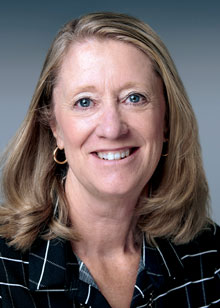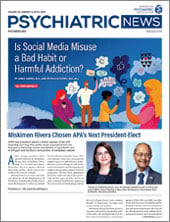The National Academies of Sciences, Engineering, and Medicine has convened a committee of experts to study the challenges that patients face in accessing high-quality behavioral health care through Medicare, Medicaid, and Marketplace Health Insurance programs.
The committee is focused specifically on workforce issues and what incentivizes or disincentivizes behavioral health professionals from participating in these public insurance programs. The goal is to develop recommendations and innovative strategies that would increase the number of professionals who accept payment from these programs and thus improve access to care. A report detailing the committee’s findings and its recommendations is due to be released in September.
The committee is chaired by Daniel Polsky, Ph.D., the Bloomberg Distinguished Professor of Health Economics at John Hopkins University. Among the committee members are two APA members: John Torous, M.D., the director of the Digital Psychiatry Division in the Department of Psychiatry at Beth Israel Deaconess Medical Center, and Rachel Talley, M.D., an assistant professor of clinical psychiatry in the Department of Psychiatry at the University of Pennsylvania.
“We see this study as a critical element in increasing access to the existing behavioral health workforce so we can serve the full range of people with mental illnesses and substance use disorders,” said past APA President Anita Everett, M.D., in a statement to Psychiatric News.
Everett is the director of the Center for Mental Health Services at the Substance Abuse and Mental Health Services Administration (SAMHSA). SAMHSA is one of the study’s sponsors, along with the Centers for Medicare & Medicaid Services.
“The government is very interested in and aware of the national concerns about [access to behavioral health care] and in doing what we can do within our abilities to improve access to and the quality of treatment,” Everett said during the committee’s first
public meeting last August.
One of the benefits of sponsoring such a project is that the National Academies completes the project independently, then makes recommendations to the government, Everett said. Currently, the committee is soliciting input from behavioral health professionals, including psychiatrists, psychologists, advanced practice nurse practitioners, social workers, and peer support specialists. These professionals can complete a
survey through which they share their experiences and can explain why they do not participate in Medicare, Medicaid, or Marketplace insurance programs.
Many studies have documented the lack of behavioral health professionals’ participation in these insurance programs, often focused on psychiatrists. About 35% of psychiatrists participated in Medicaid in 2014-2015, compared with 71% of primary care providers, according to a 2019
study in
JAMA Psychiatry. A 2022
study in
JAMA Network Open found that, in 2019, 55% of psychiatrists billed Medicare for services, a decrease compared with 2013, when 61% of psychiatrists billed Medicare. Further, according to the Kaiser Family Foundation,
7.5% of psychiatrists formally opted out of the Medicare program in 2022, compared with an average of 1% among all physicians.
Similar issues exist among psychologists. The results of a 2021
survey conducted by the American Psychological Association found that 31% of health service psychologists accepted Medicaid and 46% accepted Medicare.
During the August meeting, Everett explained that the committee is charged with exploring three factors that influence behavioral health professionals’ participation in these programs:
•
Current perceptions and/or experiences among these professionals, especially among trainees, that may challenge or impede participation.
•
Administrative processes and policies that produced perceived or experienced burdens and the ways in which those processes may be clarified, simplified, or streamlined.
•
Infrastructure requirements that are necessary for these professionals to participate, such as electronic health records, third-party billing systems, and/or data collection.
“We would like some really deep thinking about what models we might pursue that might help more providers participate in these public payer systems,” Everett said during the meeting. “We’re looking for very concrete recommendations.” ■

